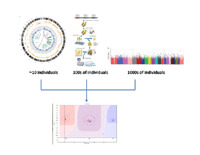Lung Genomics Research Consortium (LGRC) is a multi-institutional program led by National Jewish Health that utilizes a number of genomic technologies and provides opportunities for sophisticated bioinformatics approaches to analysis and data integration. The goal of this project is to establish the genetic, molecular, and quantitative clinical phenotypes underlying chronic lung diseases.
Chronic lung diseases affect a significant portion of the population, the incidence of COPD/emphysema and pulmonary fibrosis are increasing annually, with COPD already the fourth leading cause of death in the U.S. (www.cdc.gov (Opens in a new window)).
Pulmonary fibrosis is a substantial public health problem among the elderly, and can result from environmental exposures, such as inhalation of fibrogenic dusts or aerosolized organic antigens, drug toxicity, systemic diseases, or occur as an isolated, sporadic disease. The incidence of idiopathic pulmonary fibrosis (the most severe form of pulmonary fibrosis) has doubled over the past decade and death rates continue to rise, especially among the elderly.
Evidence for genetic factors influencing the development and pattern of COPD include the variable penetrance in tobacco smokers, the familial aggregation of the disease, and the known association with alpha-1-antitrypsin deficiency1.
Evidence for a genetic basis to pulmonary fibrosis is substantial with familial aggregation confirmed through a variety of studies in twins, siblings raised apart, and multigenerational families2.

Epigenetic mechanisms, as a cause of chronic lung conditions, build on our current knowledge about the etiology of chronic lung disease (non-Mendelian inheritance and effects of the environment) and provide an entirely novel paradigm for these diseases.
LGRC is conducting high-throughput screens followed by focused validation studies in the areas of genetic variance, epigenetic marks, mRNA and miRNA expression profiles (Figure 1). The bioinformatics teams at all participating institutions including National Jewish Health are developing analysis approaches to identify genetic and epigenetic factors that play a role in the development and progression of chronic lung disease.
References
- Pillai SG, Ge D, Zhu G, Kong X, Shianna KV, Need AC, Feng S, Hersh CP, Bakke P, Gulsvik A, et al. A genome-wide association study in chronic obstructive pulmonary disease (copd): Identification of two major susceptibility loci. PLoS Genet 2009;5:e1000421.
- Steele MP, Speer MC, Loyd JE, Brown KK, Herron A, Slifer SH, Burch LH, Wahidi MM, Phillips III JA, Sporn TA, et al. The clinical and pathologic features of familial interstitial pneumonia (fip). American Journal of Respiratory and Critical Care Medicine 2005;172:1146-1152.